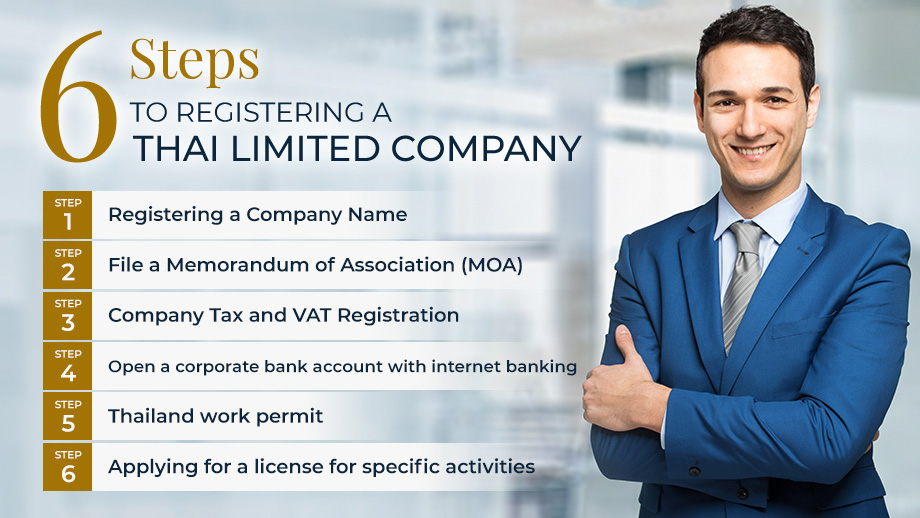
Updated: 2nd January 2025
Registering a company in Thailand enables a pathway for expats to conduct business and stay long term in the kingdom.
The process to register a Thai company is easy and the benefits are greater than operating offshore. At TILA Legal, we have a staff of knowledgeable, English-speaking lawyers.
Our firm has extensive experience in Thailand company registration and has been setting up all types of businesses for more than 17 years. So if you wish to set up a limited-company in Thailand, we can help you and ensure that your business is operating in as little as two weeks.
Company Registration Services

of Thai Company

Issue Legal VAT Invoices

Bank Account with
Internet Banking

Business Visa for Long Term
Stay

a Work Permit

& Support
The process to register a company in Thailand is mostly straightforward, but there are some difficulties that foreigners often experience. However, with our assistance, the process is relatively simple and easy, and we will ensure that you retain full control and ownership of your company.
Establishing a private limited company is the most popular and easiest way to begin trading legally in the country and to employ staff, to open a bank account, and to deal with tax issues.
TILA Legal is a recognized, leading, one-stop legal firm in Thailand. Their English-speaking lawyers have vast experience partnering with entrepreneurs on their journey to registering a company, offering advice on every aspect of business law and solutions on navigating tricky visa and work permit issues.
If you're currently staying in Bangkok, we can give you a free, no-obligation legal consultation to answer any of your questions and let you know more about what's involved in registering a company here in Thailand. Our firm's office is located near the Phom Prong BTS sky train station, for a map and directions you can find it on tilalegal.com/contact-us Simply let us know what date and time you'd like to meet.
If you're not currently in Bangkok, that is ok we are able to assist you remotely, however should you choose us to set up your Thai company you will just need access to a scanner should we require any documents from you.
 What Does Thailand Company Registration Cost?
What Does Thailand Company Registration Cost?
See Our Thailand Company Registration Packages 2025
Overview
Operating similar to a US-based limited liability company, a private limited company in Thailand can be up and running in as little as two weeks with TILA Legal's expert help. Establishing such a company gives you SIX advantages:
- Limited liability means a shareholder is limited to the registered capital they invest;
- There is clear understanding of everyone's legal obligations as all are set out in writing;
- There is in-built flexibility for a limited company to engage in different and licensed business activities;
- There is ability to operate corporate bank accounts, and online banking;
- Hands-on foreign ownership helps maintain a controlling interest;
- The system enables application for work permits for foreign staff.
Interested? Some Need to Know Details
Before you set up and step up into the Thai business landscape, there are a few must-knows to consider.
A limited company will be typically owned by at least two shareholders one of whom is a nominated director. As for company registration in Thailand, it’s important to be aware that at least 51 percent of a company’s shares must be held by Thai citizens. The remaining shares may be held by anyone. In spite of this, it is still possible for a foreigner to maintain a controlling interest in a company by issuing two separate classes of shares: ordinary and preferred.
Shareholders with ordinary shares have more voting rights in the company. At least one director is chosen by the shareholders. Only the director(s) is authorized to sign anything on behalf of the company, and individual shareholders are only liable to their percentage of shares.
There needs to be a minimum of 2 million Thai Baht of registered capital in order to be eligible for a work permit. However, this does not mean that you need to have this amount of money to start, it is merely the limited liability of your Thai limited company.
The head office needs to be in Thailand and a Letter of Consent must be obtained from the landlord. If you have some problem to use your address to be a Thai company address TILA Legal can offer our virtual office address services for Thailand company registration and range from 2,000THB monthly (minimum 3 months).
How To Set Up A Thai Limited Company

STEP 1: Registering a Company Name
TILA Legal will submit your preferred company name and two alternatives to the Commerce Ministry's Department of Business Development (DBD). It will be registered if it is not identical to pre-registered existing company name. The name must not violate ministerial rules, will be registered in Thai, and the company must end in Limited.
STEP 2: File a Memorandum of Association (MOA)
The MOA, signed by all shareholders, provides the names and contact details of the company's shareholders, the company's address, registered capital, intended scope of business activities, and the amount of share capital and shares issued to each shareholder.
The MOA must be submitted to the DBD in Bangkok or a province's filing office where the company is based. Once processed, the Ministry of Commerce will issue the company affidavit, certification, list of shareholders and company articles of association. A statutory meeting should be held once the MOA is registered.
STEP 3: Company Tax and VAT Registration
All documents associated with the registration of the company's Tax ID Card and Vat Certificate must be submitted to the Central Filing Office of the Revenue Department. Learn more about VAT registration here.
Also, as part of the process of obtaining a VAT Certificate, you must obtain permission from the landowner of your company’s address if your company does not own the land outright.
There is one other thing to be aware of: if you intend to locate your company in a condominium unit, you may be unable to do so; some condominium buildings have specific provisions with their sales agreements which prohibit the owner from using that unit as a business. Be sure to check your agreement before registering the location of your company.
If you have some problem to use your address to be a Thai company address TILA Legal can offer our virtual office address services for Thailand company registration and range from 2,000THB monthly (minimum 3 months).
STEP 4: Open a corporate bank account with internet banking
Companies can open a corporate bank account in Thailand once company registration is complete. TILA Legal will prepare the required documents and open a corporate bank account on your behalf, but the company directors must be present.
If any of the signatories for the bank account are foreigners, some banks will require each foreign signatory to submit a valid work permit before opening the account. This can be completed within a day. The process for Thai company registration including company bank account will take approximately two weeks. Learn more about opening company bank account here.
STEP 5: Thailand work permit
In order to obtain a Thailand work permit, you must first have a Non-immigrant business visa. (often called a Non-B Visa) or a Thai marriage visa. We will assist you in the application of a Thai work permit and will submit all necessary documentation to the Department of Labor on your behalf. If submitted correctly, an application can be processed in as little as seven days. Learn more about Work Permits in Thailand here, and Non-B Visa here.
STEP 6: Applying for a license for specific activities
Businesses, such as import/export, fitness/gym/spa, recruitment, tour/travel, are required to apply for a specific permission/license. TILA can assist with this application process.
TILA Legal: Your Partner in Business
Living in unpredictable times means it is good to have a stable, reliable and transparent partner.
TILA Legal has vast experience helping limited companies navigate the hurdles of registering their business in rapidly-developing Thailand. Our English-language lawyers can lead you through the process quickly and easily, and meet your needs with tailor-made requirements.
Further, for each foreigner working within your company, your company is required to have a registered capital of 2,000,000 THB, i.e. if you have two non-Thai working in your company, it is required to have a registered capital of at least 4,000,000 THB. However this does not mean that you need to have this amount of money to start, it is the limited liability of your Thai limited company.
If you are currently not employed by a Thailand company and wish to apply for a Thailand work permit, you will first need to register a company in Thailand.
Note. You can contact our English-speaking lawyers for more information or submit your business activities, questions and your contact details in the box below.
See Our Thailand Company Registration Packages 2025
Note. For Thailand company registration, Thailand work permit, and Thailand visas, please note that TILA Legal can provide any service you need. Even if you do not have all of the documents required by the government, TILA Legal will work with you to ensure that your needs are met.

